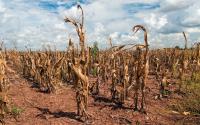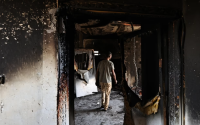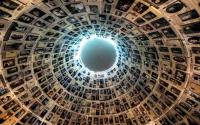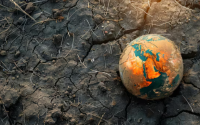9 September 2005The Independent
A series of deadly bomb attacks in and around the city of Basra this week has undermined the British Army's claim to have largely kept southern Iraq free from the violence engulfing the rest of the country.
Sixteen people were killed and 21 injured when a car bomb exploded outside a restaurant near a market in the centre of Basra on Wednesday. Two police cars and several shops were destroyed.
On the same day a roadside bomb killed four American private security guards when the explosion threw the SUV in which they were travelling into a ravine where it landed on its roof. The men were working for the US consulate. Al-Qa'ida militants based in Iraq claimed responsibility in a statement on the internet.
Earlier in the week, two British soldiers were killed by a bomb as they travelled west of Basra, a mostly Shia city of 1.5 million people.
The most likely explanation for the rise in violence in the area is that al-Qa'ida wants to show that it can strike anywhere in Iraq. The restaurant blown up was in Hayaniyah market in a Shiah district of Basra, which is in keeping with al-Qa'ida's policy of attackingplaces where Shia civilians are known to gather.
British authority in the far south of Iraq has been looking increasingly shaky in recent weeks as Shia militias, often in control of local police, gain in strength. There has been a spate of assassinations of Sunni political leaders and former Baath party members in the city by men wearing police uniforms and using vehicles with police markings.
The most powerful militia is the Badr Brigade (renamed the Badr Organisation and supposedly disarmed). It is the military arm of the Supreme Council for Islamic Revolution in Iraq, which is the largest Shia party and which did well in the elections in January. The Army of Mehdi, which is loyal to the radical cleric Muqtada Sadr, is also influential.
Local officials acknowledge that three-quarters of the 13,600 police force in Basra gave their loyalty to the religious parties. More than 65 assassinations, mostly against Sunni, have been carried out in Basra since May. An American journalist who wrote about the infiltration of local police by the militias was murdered, apparently by policemen. If the Sunni community feels under threat from Shia militants then it may, as in Baghdad, become more inclined to support the insurgents.
There are an increasing number of sectarian killings all over Iraq. The police in Baghdad said yesterday they had found 15 bodies dressed in civilian clothes near the town of Mahmoudiyah, a militant Sunni stronghold 20 miles south of Baghdad. All had been shot dead. Two other bodies, blindfolded and handcuffed, were found closer to Baghdad. Last month 36 Sunnis arrested in Baghdad by Shia security men were found dead near the Iranian border.
US military operations frequently exacerbate sectarian tensions. In the city of Fallujah, much of which was destroyed when US Marines stormed it last November, insurgent fighters are reasserting control because of the arrival of Shia units of the Iraqi army, which are detested by local people. In the Sunni city of Tikrit, US troops are being reinforced by mainly Kurdish Iraqi army soldiers.
In the far north of the country, US and Iraqi army units are surrounding the Turkoman town of Tal Afar in the far north of Iraq close to the Syrian border, which they say is a stronghold for insurgents. Most of the population have fled. An Iraqi army captain, Mohammed Ahmed, said: "Our forces arrested 150 non-Iraqi Arabs yesterday in addition to 50 Iraqi terrorists with fake documents as they were trying to flee the city with civilian families."
Tal Afar is in an area that is contested between Kurds, Arabs and Turkomans. The Turkomans say Kurdish leaders are manipulating US officers to get them to advance Kurdish policies.






